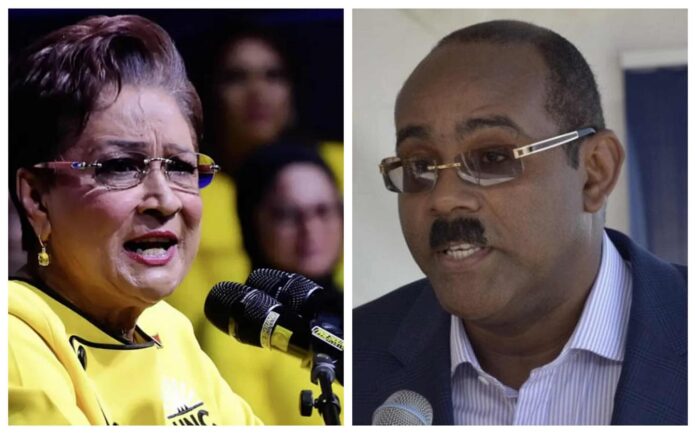Antigua and Barbuda Prime Minister Gaston Browne has warned that while Trinidad and Tobago’s recent increase in import duties on certain Caricom products may be acceptable for health reasons, any wider application could violate the Treaty of Chaguaramas. Browne also cautioned that, as the “supermarket of the Caribbean,” T&T could face a “boomerang effect” if the policy is mishandled.
Speaking yesterday, Browne reminded “my dear friend, Kamla” of the need to strengthen regional integration.
“We are all part of the same community, geography, and history, and we have to preserve those relations,” he said. “There’s a need to strengthen the integration movement, not fracture it.”
His comments followed T&T’s announcement last week that import duties on Caricom-made malt beverages, beer, rum, cigarettes, and tobacco would be increased by 100 per cent. Planning Minister Kennedy Swaratsingh said the measure responded to concerns from the local manufacturing sector, which said the previous tariff structure put them at an unfair disadvantage. Swaratsingh also cited the health risks associated with these products as justification for the hike.
On the duty increase, Browne said he would examine the Treaty of Chaguaramas to determine whether the move breaches its provisions on the free movement of goods.
“From a technical perspective, the increase may seem necessary,” he said. “But if it goes beyond health protection, it could bring into focus T&T’s obligations under the Treaty and may constitute a violation. T&T would not want to see its status as the ‘supermarket of the region’ eroded, especially if tariff increases hurt it more than other territories in the region.”
Browne noted that under the Common External Tariff, the Organisation of Eastern Caribbean States (OECS) can source cheaper goods from other territories, highlighting the need for caution under the Caricom Single Market and Economy (CSME).
“While higher duties to protect health are understandable, based on certain statements from my dear friend Kamla, I just hope she understands that if we are part of the same community, there’s a need to strengthen integration, not fracture it—especially given the current geopolitical landscape and certain situations in the southern Caribbean that could destabilise the region,” Browne said.
He also stressed the importance of respecting human rights and international law while addressing narco-trafficking.
“Don’t throw out the baby with the bathwater,” he added, urging against allowing external powers to destabilise the region. “Your Prime Minister would be well advised to be more synoptic and do all in her power to protect Caribbean unity.”
Foreign and Caricom Affairs Minister Sean Sobers did not immediately respond to a request for comment on Browne’s statement that the duty increase may be acceptable for health reasons but could otherwise violate the Treaty.
T&T remains integral to Caricom, says Douglas
Last Sunday, Dr Denzil Douglas, chairman of Caricom’s Council for Foreign and Community Relations (COFCOR) and former prime minister of St Kitts and Nevis, affirmed that while the situation between T&T and Caricom may appear uncertain, T&T remains an integral part of the regional movement.
Douglas made the comments in response to concerns about T&T’s position on regional peace and its support for the US-led anti-drug mission, which has so far destroyed 15 vessels and resulted in 64 deaths.
“The situation between T&T and Caricom may seem one of uncertainty and hesitancy,” Douglas said. “But we are certain that T&T is part of Caricom and an integral part at that.”
He added that COFCOR is not alarmed by T&T’s actions.
“Caricom doesn’t have a problem with T&T. T&T and Caricom are still one,” Douglas said, reassuring the region that the twin-island nation remains fully engaged in the integration process.


